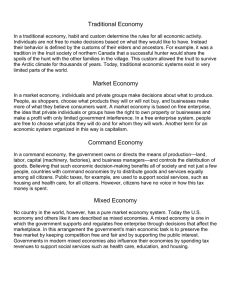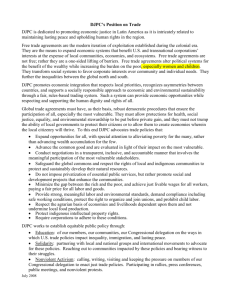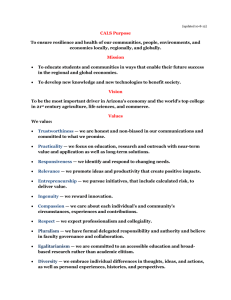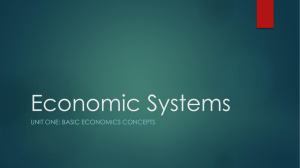W T O
advertisement
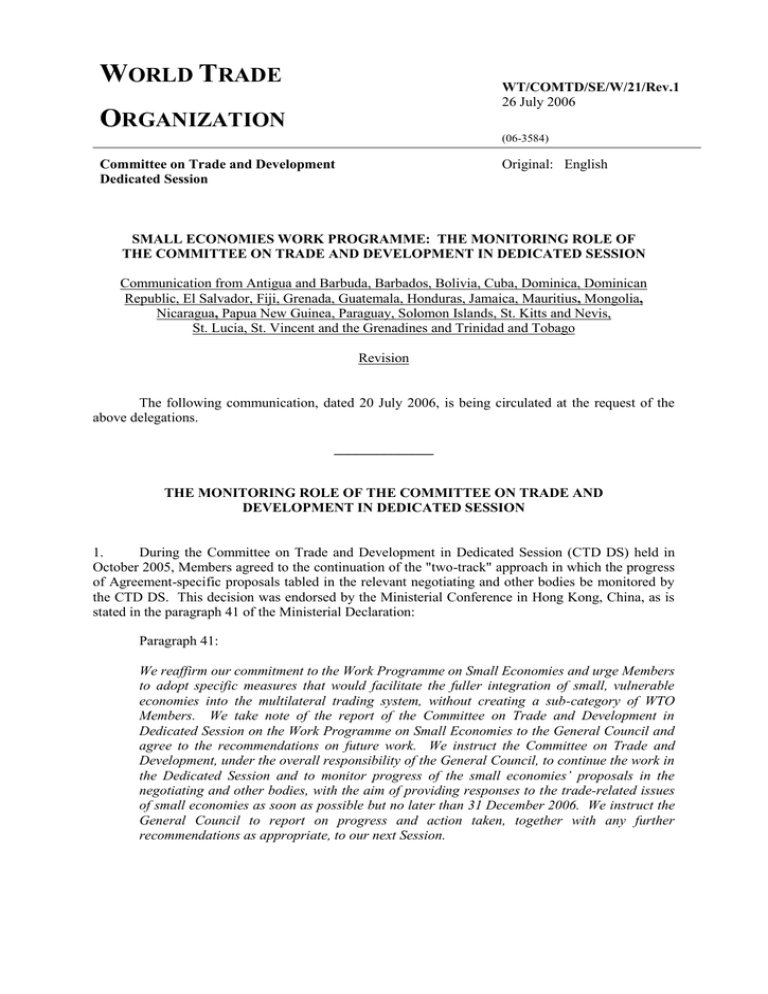
WORLD TRADE WT/COMTD/SE/W/21/Rev.1 26 July 2006 ORGANIZATION (06-3584) Original: English Committee on Trade and Development Dedicated Session SMALL ECONOMIES WORK PROGRAMME: THE MONITORING ROLE OF THE COMMITTEE ON TRADE AND DEVELOPMENT IN DEDICATED SESSION Communication from Antigua and Barbuda, Barbados, Bolivia, Cuba, Dominica, Dominican Republic, El Salvador, Fiji, Grenada, Guatemala, Honduras, Jamaica, Mauritius, Mongolia, Nicaragua, Papua New Guinea, Paraguay, Solomon Islands, St. Kitts and Nevis, St. Lucia, St. Vincent and the Grenadines and Trinidad and Tobago Revision The following communication, dated 20 July 2006, is being circulated at the request of the above delegations. ______________ THE MONITORING ROLE OF THE COMMITTEE ON TRADE AND DEVELOPMENT IN DEDICATED SESSION 1. During the Committee on Trade and Development in Dedicated Session (CTD DS) held in October 2005, Members agreed to the continuation of the "two-track" approach in which the progress of Agreement-specific proposals tabled in the relevant negotiating and other bodies be monitored by the CTD DS. This decision was endorsed by the Ministerial Conference in Hong Kong, China, as is stated in the paragraph 41 of the Ministerial Declaration: Paragraph 41: We reaffirm our commitment to the Work Programme on Small Economies and urge Members to adopt specific measures that would facilitate the fuller integration of small, vulnerable economies into the multilateral trading system, without creating a sub-category of WTO Members. We take note of the report of the Committee on Trade and Development in Dedicated Session on the Work Programme on Small Economies to the General Council and agree to the recommendations on future work. We instruct the Committee on Trade and Development, under the overall responsibility of the General Council, to continue the work in the Dedicated Session and to monitor progress of the small economies’ proposals in the negotiating and other bodies, with the aim of providing responses to the trade-related issues of small economies as soon as possible but no later than 31 December 2006. We instruct the General Council to report on progress and action taken, together with any further recommendations as appropriate, to our next Session. WT/COMTD/SE/W/21/Rev.1 Page 2 In addition to paragraph 41, the Declaration of the Sixth Ministerial Conference also states the following: NAMA Negotiations - paragraph 21 of the Declaration We note the concerns raised by small, vulnerable economies, and instruct the Negotiating Group to establish ways to provide flexibilities for these Members without creating a subcategory of WTO Members. Services Negotiations – Annex C, paragraph 8 Due consideration shall be given to proposals on trade-related concerns of small economies. 2. The small, vulnerable economies are therefore presenting this document entitled "The Monitoring Role of the Committee on Trade and Development in Dedicated Session" to facilitate the work of the Dedicated Session in fulfilling its monitoring role under the Hong Kong Ministerial Declaration. The monitoring process in the Dedicated Session will assist in achieving the aim of the Work Programme on Small Economies to "frame(s) responses to the trade-related issues identified for the fuller integration of small, vulnerable economies into the multilateral trading system…". 3. The document is a factual compilation of the relevant sections of the proposals made by the small, vulnerable economies in the negotiating and other bodies of the WTO and is submitted for the acknowledgement, discussion and monitoring of the CTD DS.1 PROPOSALS TABLED IN THE RELEVANT NEGOTIATING AND OTHER BODIES Committee on Agriculture - Special Session Agriculture - TN/AG/GEN/11 (11 November 2005) Proponents: Barbados, Bolivia, Cuba, Dominican Republic, El Salvador, Fiji, Guatemala, Honduras, Mauritius, Mongolia, Nicaragua, Papua New Guinea, Paraguay and Trinidad and Tobago. Small, vulnerable economies, with the exception of LDCs, whose average share of world merchandise exports over the period 1995-2004 does not exceed 0.10 per cent, will make a contribution to the reform process in agriculture according to the following provisions: 1 Small, vulnerable economies will undertake linear cuts not exceeding 15 per cent, with a minimum of 10 per cent per tariff line, from the bound rate. No further commitments will be expected from the small, vulnerable economies on the basis of modalities that may be agreed with respect to other elements under the market access pillar. No tariff capping shall apply to the small, vulnerable economies. Modalities shall provide for substantial improvement in market access for products of export interest to small, vulnerable economies. Other specific proposals have been tabled in the CTDDS as follows: - Technical Barriers to Trade - WT/COMTD/SE/W/15 (18 October 2005). - Sanitary and Phytosanitary Measures - WT/COMTD/SE/W/16 (18 October 2005). - Intellectual Property Rights - WT/COMTD/SE/W/18 (18 October 2005). - Accession to the WTO - WT/COMTD/SE/W/17 (18 October 2005). WT/COMTD/SE/W/21/Rev.1 Page 3 Small, vulnerable economies will designate Special Products based on their food security, livelihood security and rural development needs. Special Products (SPs) of small, vulnerable economies will be exempted from tariff reductions and tariff rate quota commitments. All agricultural tariff lines will be eligible for the Special Safeguard Mechanism (SSM). SPs of small, vulnerable economies will have automatic access to the SSM. The small, vulnerable economies insist that the SSM shall contemplate price and volume-based triggers. Remedy measures should be effective and flexible to respond to the needs of the small, vulnerable economies. Agriculture - Contribution on the Chairman's Reference Paper on Small Vulnerable Economies (SVES) - JOB(06)/164 (31 May 2006) Proponents: Barbados, Bolivia, Cuba, Dominican Republic, El Salvador, Fiji, Guatemala, Honduras, Mauritius, Mongolia, Nicaragua, Papua New Guinea, Paraguay, and Trinidad and Tobago. Criteria for defining SVEs In paragraph 3 of this reference paper, the Chairman notes that the criteria to define SVEs are being discussed in other negotiating bodies. It is worth noting that the SVEs have recently presented a submission in the Negotiating Group on Non-Agricultural Market Access (NAMA)2 proposing that countries whose average share for the period 1999-2004 (a) of world merchandise trade does not exceed 0.16 per cent and (b) of world NAMA trade does not exceed 0.10 per cent and (c) of world agricultural trade does not exceed 0.40 per cent should be identified as SVEs. The SVEs would wish to highlight that the vulnerability that characterizes them affects their trade performance in the non-agricultural and agricultural sectors. In this sense, the same criteria should prevail in both negotiating areas and we fully endorse the use of the criteria submitted in the NAMA Negotiating Group for the agriculture negotiations. Why should additional provisions for SVEs be considered for the inclusion in the agriculture modalities? Additional provisions for SVEs should be considered for the inclusion in the agriculture modalities because: SVEs face a higher risk of marginalization from the global economy than many other developing countries in view of the vulnerability of the economies and of their exposure to several geographical factors, which erode their competitiveness. The specific characteristics and problems faced by SVEs were enumerated in their submission WT/COMTD/SE/W/12 (21 February 2005). These include, among others, the size of their economies and their domestic markets, frequent exposure to natural shocks, dependence on a very limited number of goods and/or markets, geographical disadvantages in some cases, such as lack of access to the sea and long distance from world markets. SVEs have expressed that the trade-related problems they confront in view of their vulnerabilities could be addressed through flexibilities. These would contribute to 2 Circulated as a room document on 10 May 2006. WT/COMTD/SE/W/21/Rev.1 Page 4 enhance their participation in the multilateral trading system, in accordance with their development, economic, financial and trade needs. Because the negotiating mandate instructs to address the trade-related issues identified for the fuller integration of SVEs into the multilateral trading system (July Package 3, para. "other development issues") and to provide responses to the trade-related issues of SVEs as soon as possible (Hong Kong Ministerial Decision, paragraph 41). Why should additional provisions for Small Vulnerable Economies be considered for the inclusion in the agriculture modalities at this stage? What specific provisions should be envisaged? The group takes the point raised by the Chairman in the sense that there is a certain level of uncertainty surrounding the distinct elements of the general provisions for market access and related special and differential treatment. However, during the Hong Kong Ministerial Conference a decision was made with regards to: The structure of the formula used for tariff reduction (tiered formula with four bands); and The designation of special products by developing country Members (they will have the flexibility to self-designate an appropriate number of tariff lines as Special Products guided by indicators based on the criteria of food security, livelihood security and rural development). The level of ambition, which the SVEs is seeking is spelt out in paragraph 8 of TN/AG/GEN/11. In this sense, given the current stage of the agriculture negotiations, provisions applicable to SVEs should be based on the following principles: SVEs will contribute less than other developing countries in terms of tariff reduction. SPs designated by SVEs should be exempted from tariff reduction, capping, tariff-quota commitments. They will also have the right to have recourse to a Special Safeguard Mechanism based on import quantity and price triggers. Modalities shall provide for substantial improvement in market access for products of export interest to SVEs. Negotiating Group on Non-Agricultural Market Access NAMA - TN/MA/W/66 (11 November 2005) Proponents: Antigua and Barbuda, Barbados, Bolivia, Dominica, Dominican Republic, El Salvador, Fiji, Grenada, Guatemala, Honduras, Mongolia, Nicaragua, Papua New Guinea, Paraguay, St. Kitts and Nevis, St. Lucia, St. Vincent and the Grenadines and Trinidad and Tobago. As their contribution to the NAMA negotiating process, small, vulnerable economies propose that developing countries, not covered in paragraph 6 and paragraph 9 of Annex B, and whose average share in total world merchandise exports does not exceed 0.10 per cent over the period 1995-2004, will be expected to: 3 "Doha Work Programme: Decision Adopted by the General Council on 1 August 2004". Document No. WT/L/579 (2 August 2004). WT/COMTD/SE/W/21/Rev.1 Page 5 (a) Make tariff reductions not exceeding 15%, but with minimum cuts of 10% on individual lines and with no more than half the cuts at the lowest level of this range. This contribution will ensure a significant reduction of small, vulnerable economies’ tariff averages as well as a reduction in individual tariff lines. (b) On the treatment of unbound tariffs, small, vulnerable economies whose binding coverage is more then 90 per cent commit themselves to the objective of full tariff binding as an outcome of the NAMA negotiations. However, newly bound tariff lines will not be subject to reductions through the formula during these negotiations. Small, vulnerable economies are open to discuss a possible target rate at which these tariffs should be bound or a maximum rate at which to bind these lines. Small, vulnerable economies firmly believe that only tariff reductions compatible with their capacity to sustain trade reforms, as spelt out in this paper, are likely to efficiently discharge the Doha mandate. In this context, small, vulnerable economies will continue to have access to flexibilities such as those outlined in paragraph 8 of Annex B. NAMA Room Document - Criteria and Treatment of Small, Vulnerable Economies in the NAMA Negotiations (10 May 2006) Proponents: Antigua and Barbuda, Barbados, Bolivia, Dominica, Dominican Republic, El Salvador, Fiji, Grenada, Guatemala, Guyana, Honduras, Jamaica, Mongolia, Nicaragua, Papua New Guinea, St. Kitts and Nevis, St. Lucia, St. Vincent and the Grenadines and Trinidad and Tobago. The proponents believe that the elements of their initial proposal4 (TN/MA/W66) are those that would best translate the interests of the small, vulnerable economies in these negotiations. Nevertheless, as a sign of our commitment to the NAMA negotiations as well as to the objective of establishing negotiating modalities soonest, we have reviewed our position in a way that we feel best accommodates the interests of all Members. The criteria for the identification of potential developing country beneficiaries of this proposal in the NAMA negotiations, excluding LDCs, countries in transition and paragraph 6 countries, would apply to the remaining countries: whose share of world merchandise trade does not exceed 0.16 per cent; whose share of world NAMA trade does not exceed 0.10 per cent; and whose share of world agricultural trade does not exceed 0.40 per cent5 The treatment proposed for developing countries who meet the above criteria would be that these countries would not be subject to formula cuts, but would bind 100 per cent of their nonagricultural tariff lines at average levels reflected in the following tiers and bands: 4 This proposal addressed treatment on the basis of: (1) a linear cut on a line-by-line basis; (2) binding 100 per cent, if current binding coverage is over 90 per cent; (3) newly bound lines not subject to tariff reductions. 5 Data Source: WTO, 1999-2004. WT/COMTD/SE/W/21/Rev.1 Page 6 Current Bound Average % Average % Cut Final Bound Average % 0 – 30 10 0 – 27 31 – 40 15 26 – 34 41 – 50 20 33 – 40 51 – 60 25 38 – 45 61 - 30 43 - Beneficiaries with less than 50 per cent binding coverage shall be allowed to keep [5 per cent] of their lines unbound while binding the remaining [95 per cent] at an average of [ ]. The implementation of the tariff reduction commitments should be staged over a longer period than other developing countries in order to ensure a smooth liberalization process and not jeopardize the industrial and social development prospects of the small, vulnerable economies. NAMA Room Document - Treatment of Small, Vulnerable Economies in the NAMA Negotiations (15 June 2006) Small, vulnerable economies (SVEs) believe that their initial proposal (TN/MA/W/66) best translates the interests of SVEs in these negotiations. Nevertheless, as a sign of commitment to the NAMA negotiations as well as to the objective of establishing modalities that address SVEs concerns, proponents have once again reviewed their position, taking into consideration views and concerns expressed by Members. SVEs maintain that a solution can be found in a paragraph 6–type solution, and note the willingness of most Members to maintain an open position in this regard. SVEs further maintain their commitment to contribute to the Round, taking into consideration their past contributions, and according to their ability to contribute further consistent with the expected benefits for them from this Round. The following principles have guided the revision of the SVEs treatment proposal: SVEs should not be penalized for the progressive liberalization decisions they made during the Uruguay Round, nor should they be asked to accept cuts in this Round greater than Members who achieve greater benefits from the Round. The dispersion in SVEs current bound averages (32.6 to 73.0) demands variable cuts to variable final bound averages. The treatment being sought by the small, vulnerable economies should be compatible with the terms and mechanisms established in the NAMA Framework (Annex B of the July 2004 decision by the General Council) and further mandated in paragraph 21 of the Hong Kong Ministerial Declaration. This proposal builds on the treatment proposed in the Norwegian submission, which did receive some favourable responses. Full binding at any one bound average is not easily compared with less than full binding at the same bound average. WT/COMTD/SE/W/21/Rev.1 Page 7 There is no justification for all SVEs binding at a lower average than other members whose economies are at similar levels of development. Based on data from the World Trade Report 2005, SVE proponents (excluding paragraph 6 and LDC countries) have average applied rates of 7.6 per cent while paragraph 6 countries have an average of 13.8 per cent and LDCs 13.4 per cent. SVEs' effort to welcome imports is therefore clear. Proposal The treatment proposed for small, vulnerable economies would be that these countries would not be subject to formula cuts, but would bind 100 per cent of their non-agricultural tariff lines at average levels reflected in the following bands: Current Bound Average % Average % Cut Expected Final Bound Average % ≤ 37 [….] [….] 38 – 47 [….] [….] 48 – 57 [….] [….] ≥ 58 [….] [….] Tariff reduction for SVEs shall be on the basis of lower tariff cuts for those in the lower bands and higher cuts for those in the higher bands. In meeting this requirement, beneficiaries would make minimum reductions of [ ] per cent on a maximum of [ ] per cent of individual tariff lines. In the specific case of Fiji with less than 50 per cent binding coverage, Fiji shall be allowed to keep [5 per cent] of their lines unbound while binding the remaining [95 per cent] at an average of [ ]. The implementation of the tariff reduction commitments should be staged over a longer period than other developing countries in order to ensure a smooth liberalization process and not jeopardize the industrial and social development prospects of the small, vulnerable economies. Negotiating Group on Rules Fisheries Subsidies Disciplines - TN/RL/GEN/57/Rev.2 (13 September 2005) Proponents: Antigua and Barbuda, Barbados, Dominican Republic, Fiji, Grenada, Guyana, Jamaica, Papua New Guinea, St. Kitts and Nevis, St. Lucia, Solomon Islands, and Trinidad and Tobago. Small, vulnerable coastal states seek appropriate special and differential treatment in any disciplines on fisheries subsidies. In this regard the following should not be subject to subsidies disciplines: (i) Any development assistance to developing coastal states; WT/COMTD/SE/W/21/Rev.1 Page 8 (ii) Assistance to artisanal or small-scale fisheries. This requires a consensus on the definition of artisanal or small-scale. Some existing definitions of artisanal are based on vessel size in metres, capacity in gross registered tonnage (GRT), or area of operation in terms of proximity to the shoreline. We invite discussions on prevailing definitions used by Member States and possible approaches for arriving at a definition for use in the WTO; to facilitate the discussions, the sponsors of this paper will share information with Members on definitions currently being used in their respective jurisdictions; (iii) Access fees in fisheries access agreements; (iv) Fiscal Incentives - to facilitate the development of capabilities of small vulnerable coastal states. It is proposed that the special and differential treatment provisions of the ASCM for Least-Developed Countries be maintained in future disciplines. Council for Trade in Services Special Session Services – Information Note (November 2005) Proponents: Antigua and Barbuda, Barbados, Cuba, Dominica, Dominican Republic, El Salvador, Fiji, Grenada, Guatemala, Honduras, Jamaica, Mauritius, Mongolia, Nicaragua, Paraguay, St. Kitts and Nevis, St. Vincent and the Grenadines and Trinidad and Tobago. The two-track process involving the CTD and negotiating groups has therefore emerged as the process whereby the objective of framing responses to the trade related issues identified for the fuller integration of small, vulnerable economies into the multilateral trading system is being pursued. Small Economies have already and will continue to demonstrate their engagement to the services negotiations including through the tabling of initial and revised offers. Taking the above into consideration, issues of concern to small, vulnerable economies should be addressed satisfactorily in the services negotiations in order for these economies to participate meaningfully in the multilateral trading system in accordance with their level of development, market share, vulnerabilities and economic size and structure, without creating a subcategory of WTO Members. Working Party on Domestic Regulation Services - Trade-Related Concerns of Small, Vulnerable Economies in the Working Party on Domestic Regulation - JOB(06)/66 Rev.1 (2 May 2006) Proponents: Antigua and Barbuda, Barbados, Cuba, Dominica, Dominican Republic, El Salvador, Fiji, Grenada, Guatemala, Honduras, Jamaica, Mauritius, Mongolia, Nicaragua, Paraguay, St. Kitts and Nevis, St. Vincent and the Grenadines and Trinidad and Tobago. Recommendations to Address the Concerns of Small, Vulnerable Economies This section lists the specific recommendations small, vulnerable economies propose in the Article VI:4 negotiations for consideration in the disciplines to be developed for measures relating to WT/COMTD/SE/W/21/Rev.1 Page 9 qualification requirements and procedures, licensing requirements and procedures and technical standards. The list of recommendations provided in this section is not exhaustive and does not aim to prejudice the negotiating positions of the submitting Members through the course of negotiations. Small, vulnerable economies recommend that: A. B. GENERAL PRINCIPLES (i) Disciplines under Article VI: 4 shall preserve the right to regulate and shall not prevent or prescribe the development and adoption of future legislation to meet Members’ national policy objectives. (ii) The implementation of disciplines that require adjustment of existing domestic regulation and/or the adoption of new implementation mechanisms shall be consistent with their financial, administrative and institutional capabilities. (iii) Multilateral disciplines shall only apply to measures affecting services sectors when they are related to a Member’s schedule of commitments. (iv) The application of WTO disciplines in domestic regulation shall not prevent any of its Members from establishing measures or mechanisms to support the development of regional economic integration. QUALIFICATION REQUIREMENTS (i) C. D. Measures related to qualification requirements shall not be limited to qualification recognition and verification based on diplomas, test scores, and the like and shall include, but not be limited to, experience and other methods of verification, particularly those that ensure increased participation of small, vulnerable economies in services trade. QUALIFICATION PROCEDURES (i) Fees charged by the competent authorities should not be an impediment in themselves to practising the relevant activity. Developing country Members shall not be precluded from recovering fees where fees are utilized to meet national policy objectives. (ii) Measures related to qualification verification shall only be applied to establish the minimum qualifications sufficient for supplying the service. (iii) Measures related to qualification procedures shall establish clear mechanisms to demonstrate that education and experience obtained or licenses and certifications granted in the territory of a Member are comparable to those obtained or granted in the territory of another Member. LICENSING REQUIREMENTS (i) Fees charged by the competent authorities should not be an impediment in themselves to practising the relevant activity. Developing country Members shall not be precluded from recovering fees where fees are utilized to meet national policy objectives. WT/COMTD/SE/W/21/Rev.1 Page 10 E. LICENSING PROCEDURES (i) F. G. H. Measures related to licensing procedures shall aim to ensure minimal complexity and costs of requirements and procedures for entry into export markets, including lower licensing and other related fees, as well as streamlined border measures, that promote trade by small, vulnerable economies. TECHNICAL STANDARDS (i) Members shall notify in reasonable time to other Members, the establishment and application of measures relating to national or international technical standards. (ii) Members shall, where requested, grant other Members, especially developing country Members, technical assistance on mutually agreed terms and conditions regarding the establishment of technical standards and participation in the international standardizing bodies. (iii) As a matter of good practice, Members involved in the development and application of measures relating to plurilateral standards, and standards developed and applied by non-governmental standardization bodies should ensure maximum transparency of relevant processes for the benefit of other Members. TRANSPARENCY (i) Members shall ensure access to information on legislation and regulation of export markets, information on qualification requirements and procedures, licensing requirements and procedures, and technical standards. (ii) Members shall ensure the establishment of appropriate, transparent and accessible administrative and judicial channels for reviewing decisions. DEVELOPMENT OBJECTIVES (i) Small, vulnerable economies shall have adequate time to upgrade their institutional capacity to comply with Article VI:4 disciplines. (ii) Technical assistance and capacity building assistance and various types of flexibility including adequate time frames shall be provided in order to help developing countries to develop their capacity to implement new disciplines. (iii) To guarantee that qualification and licensing requirements and procedures and technical standards do not in themselves constitute barriers to trade, technical assistance and capacity building assistance shall be provided in order to help small, vulnerable economies meet such requirements and procedures. (iv) To ensure full and equal participation in the development of international technical standards, measures shall be adopted and implemented in order to ensure the full representation and effective participation of small, vulnerable economies in international standard setting bodies and in complying with the WT/COMTD/SE/W/21/Rev.1 Page 11 standards. Such measures shall include, but not be limited to, enhanced technical and capacity building assistance provided by trading partners to service suppliers of small, vulnerable economies for meeting such requirements. Committee on Subsidies and Countervailing Measures Procedures for Extensions Under Article 27.4 of the Agreement on Subsidies and Countervailing Measures - G/SCM/W/535 (12 April 2006) Proponents: Antigua and Barbuda, Belize, Barbados, Dominica, Dominican Republic, El Salvador, Fiji, Grenada, Jamaica, Mauritius, Papua New Guinea, St. Kitts and Nevis, St. Lucia, St, Vincent and the Grenadines. The sponsors of this proposal believe that the objective of "fuller integration of small, vulnerable economies into the multilateral trading system"6 could be achieved in part by reaffirming the Article 27.4 procedures and extensions within the context of the provisions of the 14 November 2001, Doha Ministerial Decision on procedures for Extension under Article 27.4 of the ASCM by granting further extensions until the year 2018. The sponsors of this proposal submit the following modification to the procedures set forth in document G/SCM/39 and call for the preparation of an addendum detailing "Procedures for Extensions Under Article 27.4 for Certain Developing Country Members" which would amend paragraph 1(e) of G/SCM/39 to state as follows: A. "Through the calendar year 2018, subject to annual reviews during that period to verify that the transparency and standstill requirements set forth in (3) and (4) are being fulfilled, Members of the Committee shall agree to continue the extensions granted pursuant to 1(c)". The extension procedures under Article 27.4 would hence be applicable to all of the members and the existing programmes referred to in Annex A in line with paragraph 2 of G/SCM/39. This extension process would be applicable from the end of 2007 through to the end of 2018 with identical procedures as indicated in G/SCM/39 paragraph 1(f) and 1(g). Negotiating Group on Trade Facilitation Regional Approaches to Trade Facilitation: Enquiry Points - TN/TF/W/129 (6 July 2006) Proponents: Antigua and Barbuda, Barbados, Dominica, Fiji, Grenada, Papua New Guinea, The Solomon Islands, St. Kitts and Nevis, St. Lucia, St. Vincent and the Grenadines. As small, vulnerable economies (SVEs), it should be recognized that the co-sponsors of this proposal suffer from a lack of adequate financial, technical and administrative capacities to implement all proposed trade facilitation measures at the national level. It should be noted that for SVEs the unit costs of adopting some measures are higher and therefore may limit the ability of SVEs to reap the full benefits of implementation. This notwithstanding, many of the co-sponsors have adopted, or are in the process of adopting trade facilitation measures autonomously in order to, lower transaction costs, improve the efficiency of port and transit procedures and improve transparency and predictability. 6 WT/L/579, 2 August 2004 para 1(d). WT/COMTD/SE/W/21/Rev.1 Page 12 There is a need in the current negotiations to identify opportunities for regional approaches to implementing trade facilitation (TF) requirements and for the provision of technical assistance and capacity building. Issues such as economies of scale, maximization of resources and targeted technical assistance and capacity building have to be important considerations in these discussions. The co-sponsors of this document have previously submitted proposals to the Committee on Trade and Development in Dedicated Session and to the WTO SPS, TBT and TRIPs Committees identifying regional approaches which could be utilized by Members to fulfill notification requirement. Additionally, regional approaches to technical assistance utilizing regional architecture to minimize administrative costs have also been proposed by the co-sponsors. This present proposal speaks specifically to a regional approach to enquiry points but does not preclude regional approaches being taken in any other relevant areas under discussion within the TF Negotiations. Proposal The proposals currently on the table recognize the importance and usefulness of enquiry points for providing information to traders and/or governments on the trade regulation of a country. This submission by the co-sponsors seeks explicit recognition that a regional enquiry point for a group of countries shall also be accepted and recognized as fulfilling any obligation under these provisions. Notwithstanding the proposal, it should be recognized that the responsibility for ensuring that the information is available to the regional enquiry point will remain with the individual WTO Members concerned. The following language is proposed for inclusion in any draft text which could be prepared in the future: "Establish enquiry points at the national level or in the case of SVEs/developing countries involved in a Customs Union, FTA/RTA, the option of the establishment of enquiry points at the regional level, to provide relevant information on trade procedures to trade." "Members and the WTO, within its competence, shall provide technical and financial assistance at mutually agreed terms to SVEs/developing countries to support the establishment, modification and maintenance of these national and/or regional enquiry points." Special and Differential Treatment SVEs/Developing countries/LDCs should have longer time periods to implement any requirement on enquiry points. It should be understood that individual members of the Customs Union/FTA/RTA may maintain a national enquiry point if it is within their ability to do so but existence of a regional enquiry point would preclude the obligation to maintain a national enquiry point. Technical Assistance and Capacity Building Requirements The regional approach lends itself to more effective and targeted forms of technical assistance and capacity building and much of the assistance would be directed towards a mechanism which would be utilized by all members of the Customs Union/RTA/FTA. To fully exploit the benefits of a regional approach capacity building and technical assistance may also be channeled to the individual members. WT/COMTD/SE/W/21/Rev.1 Page 13 The specific forms of technical assistance and capacity building required at both the national and regional level would include the following: Audit and compilation of regional trade-related legislation in an electronically exploitable format (to be carried out at the national level). Creation of a regional database with a view to harmonizing and updating the legislation. Provision of translations in Spanish, French, Dutch and English. Provision of security for data transmitted by the internet from the national governments to the regional mechanism. Review and revamping, where necessary, of national and regional trade policy communication plans to incorporate all levels of traders (commercial and informal) into the information forwarded to the regional mechanism. Creation of websites and the development of interactive software on trade regulation to ensure that the national legislation and trade policies can be fed into the regional mechanism. Training for customs and trade officials in internet publication [website data entry, monitoring and update of information] and dissemination of information. Infrastructure for the establishment/conversion/designation of a regional body or for a department within a regional body to carry out the functions of a regional enquiry point. This could include physical construction or modification of a facility; the provision of computer systems; the hiring of additional dedicated staff, etc. __________
